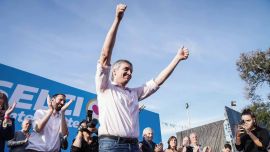YPF maybe Argentina’s largest oil company, but you wouldn’t know it by looking at its newly installed leadership. The company ontinues to go down a path of diversifying its business even as it emphasises the need to boost its shale production, primarily focused on Vaca Muerta.
YPF’s CEO Ricardo Darré resigned this past week, announcing he was stepping down from he role he was appointed to in June of last year for “personal reasons.” The move did not come as a surprise for the energy sector that had seen the writing on the wall for months.
The shake-up at the helm of YPF ended a months-long power struggle with YPF Chairman Miguel Ángel Gutiérrez. In his stead, the country’s largest energy company announced it would not appoint another CEO but rather replace Darré with a six-member executive committee, thus giving significantly more power to Gutiérrez, who in many ways had already been acting as the CEO for months.
Darré’s ouster ends an experiment at the company that began a little more than a year ago, when President Mauricio Macri’s administration pursued an effort to shake up he corporate structure at the firm. A key part of that effort involved separating the roles of chairman of the board and CEO, which had been held by Miguel Galuccio since the state renationalised a majority stake in the company in 2012.
Gutierrez had no previous energy sector experience but had close ties to several key members of the Macri administration and a proven track record of business acumen, including at JPMorgan. For the role of CEO, an international headhunting firm tapped Darré, an experienced oilman who was leading French company Total’s exploration and production unit in the United States before joining PF.
Although some in the administration were not eager for such an unknown quantity to take on the key role of CEO, others including Energy Minister Juan José Aranguren backed him, saying it was key to have an experienced oilman at the helm.
As the year went on though, Darré seemed to fade into the background while YPF focused more on cutting back costs after years of increased spending on exploration and production during Galuccio’s tenure. From a high of US$7 billion in 2015, Gutierrez was at the forefront of pushing for decreasing capital expenditures to less than US$4 billion.
In the first six months of the year, YPF’s crude oil production plunged 8.1 percent to 226,100 barrels per day, compared to the same period of last year, while natural gas production rose 1.2 percent.
Now the experienced oilman is being replaced by a group of people who also have scant direct experience in exploration. Only two of the six people in the executive committee have direct experience in il drilling, according to Bloomberg.
The de-emphasis on oil drilling experience is a sign of how YPF is seeking to diversify its core business into other sectors, including electricity generation. At the same time though, the new executive committee does include a nod that signals the increased importance of unconventional exploration for the state-controlled company. Pablo Bizzotto, widely praised in the industry as the head of the company’s unconventional efforts was named executive vice-president or upstream.
So far this year YPF has sealed several joint venture deals with international firms — including Shell, Statoil, Pan American Energy, Total and Wintershall — to explore the promising Vaca Muerta formation with an increased focus n natural gas.
Metrogas sale. Darré’s ouster came mere days after it was confirmed that YPF had hired investment bank Citigroup to sell off at least part of its stake in Metrogas, the country’s largest natural gas distributor.
Natural gas regulator Enargas had ordered YPF in February to get rid of its controlling stake in Metrogas saying it violated anti-monopoly law. At first PF vowed to fight it but now has unofficially confirmed it is going through with the sale. So far though it is far from clear whether YPF will sell its entire 70 percent stake in the company, or just 21 percent so that it is no longer the controlling shareholder in the firm.
Company officials also take pains to emphasize they are in no rush to complete the sale and will only do so once the firm receives a good offer. YPF could get as much as US$1 billion for the sale if it chooses to sell its whole stake in the company, according to market estimates.
For now, one thing is clear: YPF is trying to launch a new path.





















Comments